Do you have just one day in Naples from a cruise ship and are looking for the best things to do?
Then you’ve come to the right place. As I have visited Naples on a cruise, I can help you make the most of your day in one of the most vibrant cities in Italy.
Whether you want to eat the best pizza in the world, explore the city’s underground secrets or visit Pompeii, here are the best things to do in Naples in a day. Although you can see the sights on a shore excursion, I’ve included a useful Naples cruise port guide to help you navigate the city independently.
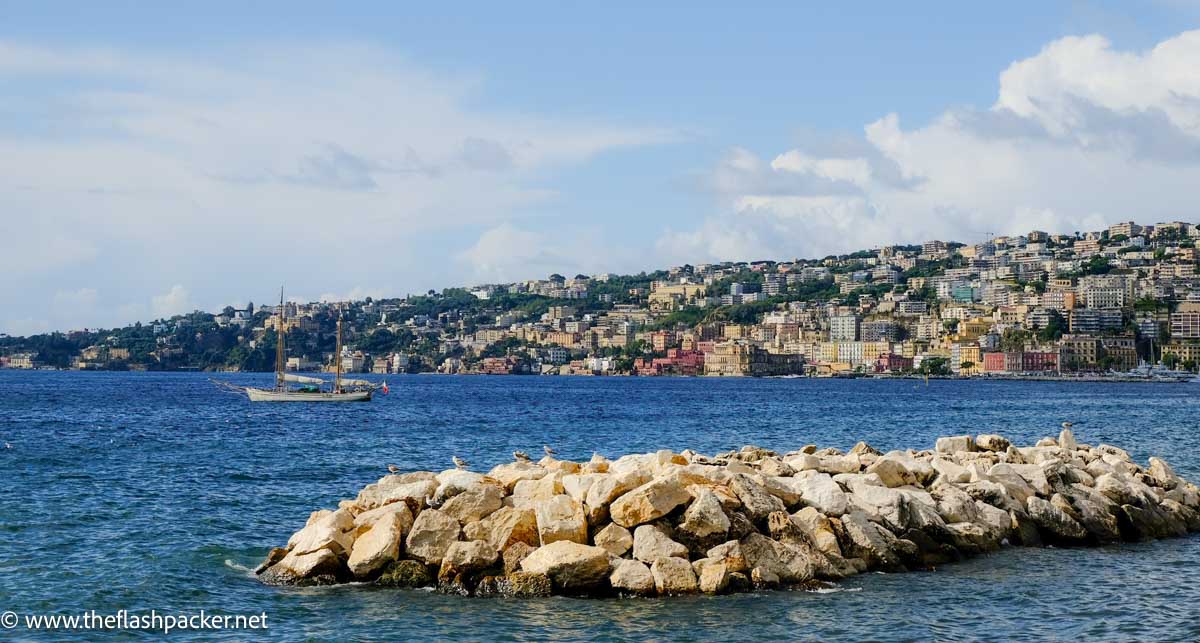
Some articles on this website contain affiliate links. This means that I may earn a small commission if you make a purchase through these links. As an Amazon Associate, I earn from qualifying purchases. Read the full disclosure here.
NAPLES CRUISE PORT AT A GLANCE
Naples cruise terminal: Most ships dock at Stazione Maritima, the cruise terminal for Naples, which is part of the Port of Naples (Porto Napoli). Ferries and hydrofoils travel sail to Capri, Ischia, Sorrento, and other cities from Molo Beverello, situated next to the cruise terminal.
Distance from the cruise terminal to the city centre: 10 minutes on foot
Best time of year to visit Naples: March to May, or during autumn (fall)
Currency: Euro (€). Cash is widely used and most places accept major credit cards. Check here for live exchange rates.
Tipping: Tips are not expected when ordering a coffee or a drink in Naples. In restaurants, it is common practice to leave a tip of around €1 per person or round up the bill to the nearest five or ten euros. 15 – 20% tips are unheard of in Italy.
TOP RATED EXCURSIONS:
Naples walking tour
Street food tour
Amalfi Coast tour
Pompeii, Herculaneum & Vesuvius tour
How I Visited Naples on a Cruise
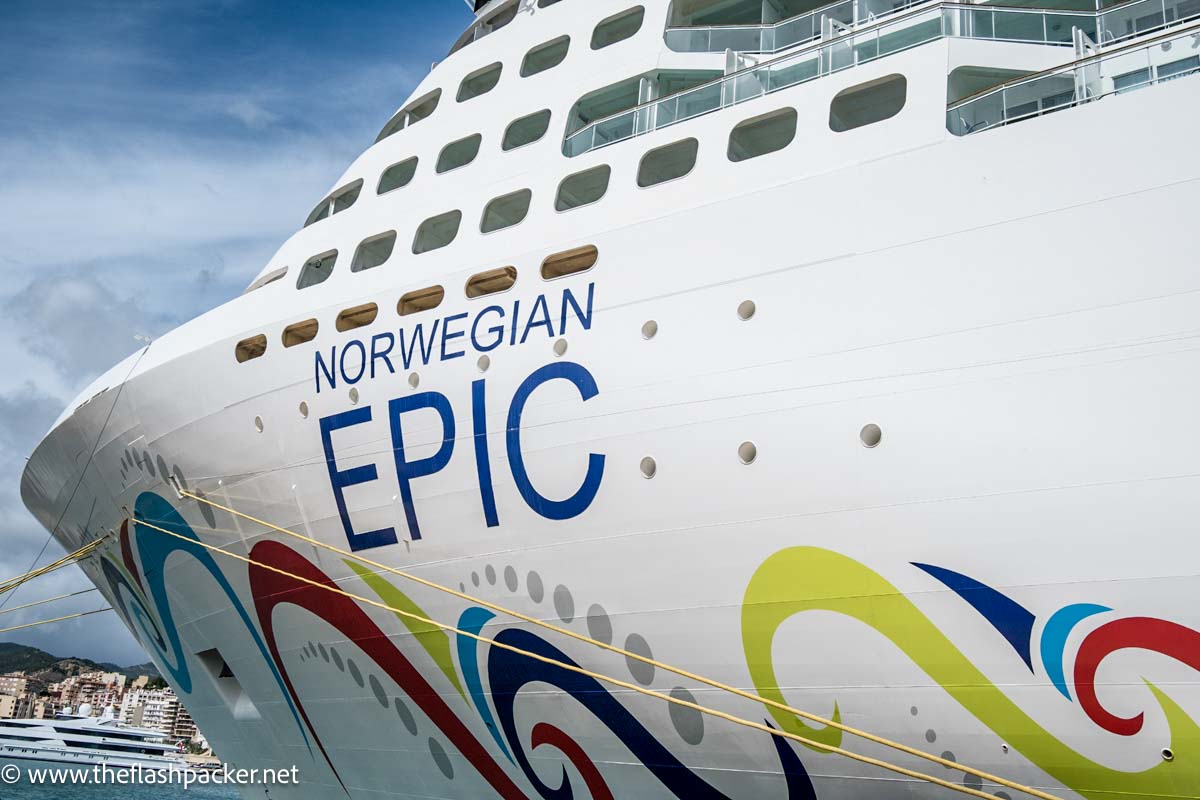
My visit to Naples was part of a Western Mediterranean cruise on NCL Epic.
Naples was an easy port of call to explore independently. Its historic city centre is only a ten-minute stroll from the port and as its main attractions are close to one another, it’s very walkable. But, if needed, I’ve included tips for using the metro in Naples later in this article (here).
I managed to visit the following attractions during my day in port:
Although I wasn’t able to visit the Naples National Archaeological Museum (MANN), I’ve included it for completeness.
If you are someone who likes to map it out, here’s one that I have prepared. For a live, interactive map, click on this link or on the image.
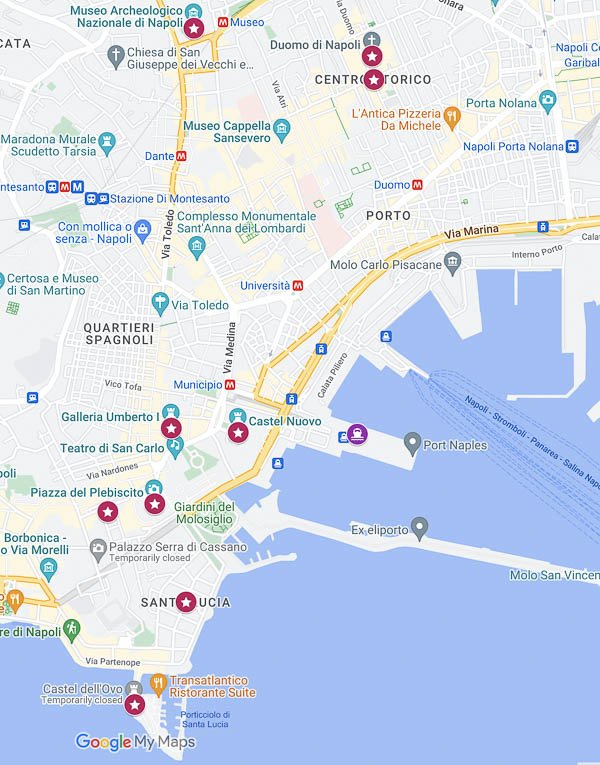
What to Do in Naples in a Day
Visit Castel Nuovo
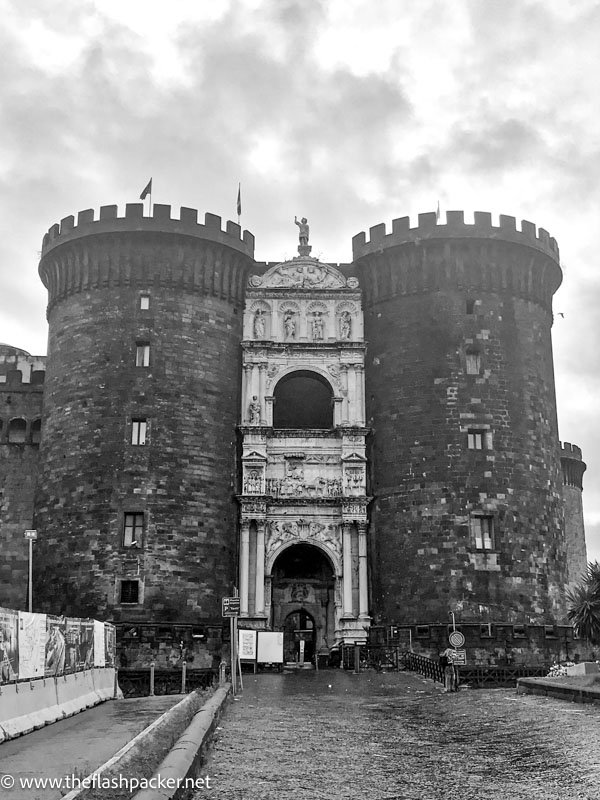
Start your day in Naples at Castel Nuovo. This enormous military castle looms over the harbour and has eccentric round towers. Built by Charles of Anjou in 1279, most of what you see today is the work of the Catalan architect Guillermo Sagrara who was also responsible for the Exchange in Palma de Mallorca.
The castle’s main entrance is an intricately carved 15th-century white marble triumphal arch, tucked between two of its towers. Inside, there are frescoes by Giotto in the Cappella Palatina and a collection of artwork by Neapolitan painters from the 17th to early 20th Centuries.
Address: Via Vittorio Emanuele III
Opening hours: Monday to Saturday: 8:30 am to 7 pm. More information here.
Admission cost: Entrance fee applies
Stop for a coffee in Galleria Umberto I
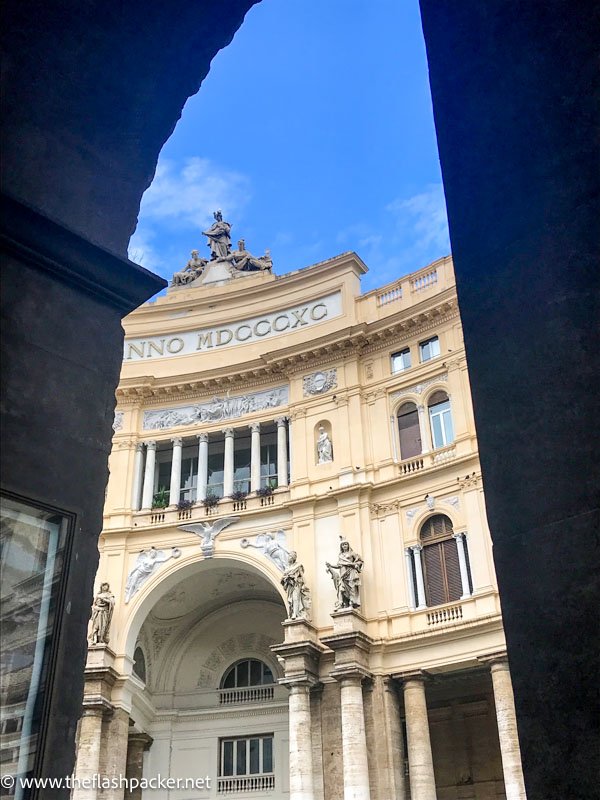
This light-filled shopping arcade was built at the end of the 19th Century as part of a project to rebuild and renovate much of Naples. Crowned with a domed glass and steel roof, and decorated with elegant murals and sculptures, the Galleria Umberto is part of the UNESCO listing of the Historic Centre of Naples as a World Heritage Site.
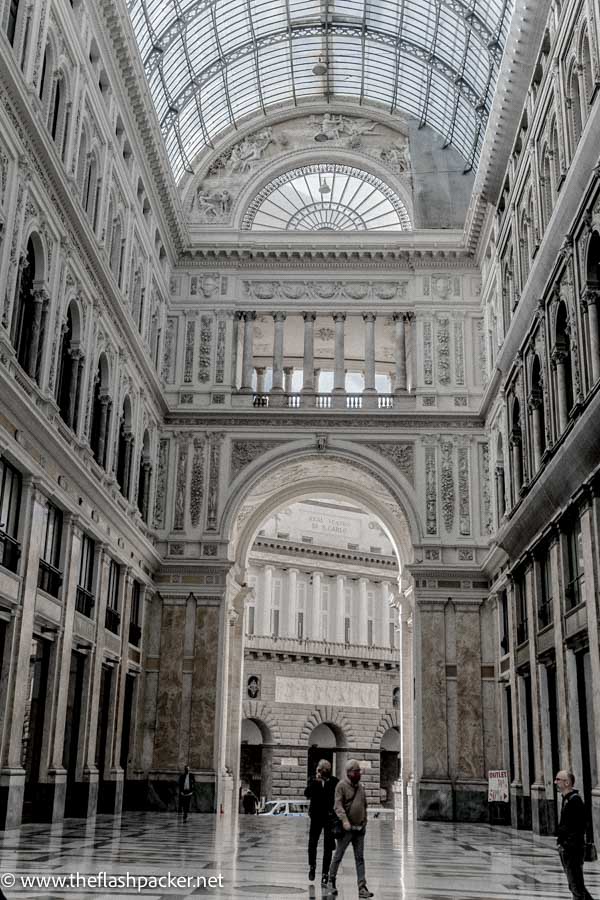
Admire Piazza del Plebiscito
After languishing as a car park between the 1960s and 1994, this immense and elegant square has been restored to its former splendour.
Piazza del Plebiscito was built from volcanic rock from Vesuvius in the first half of the 19th Century. It is named after the 1860 plebiscite that brought Naples into the unified Kingdom of Italy.
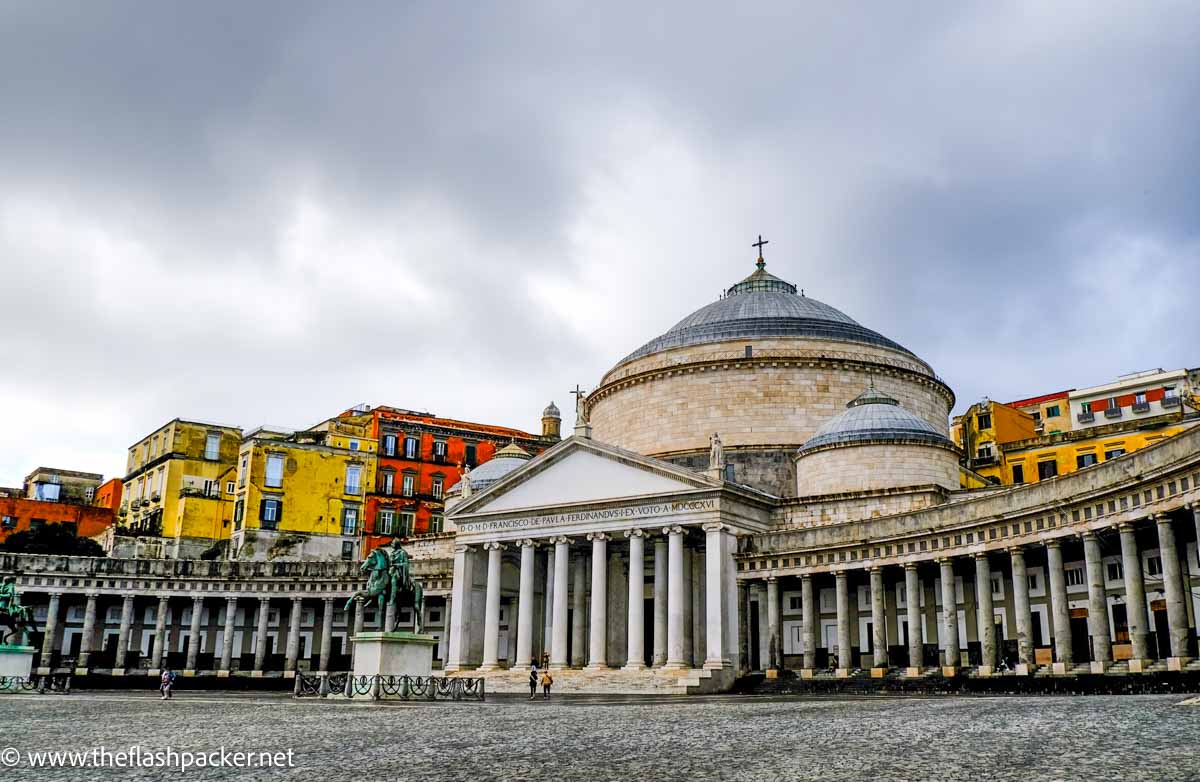
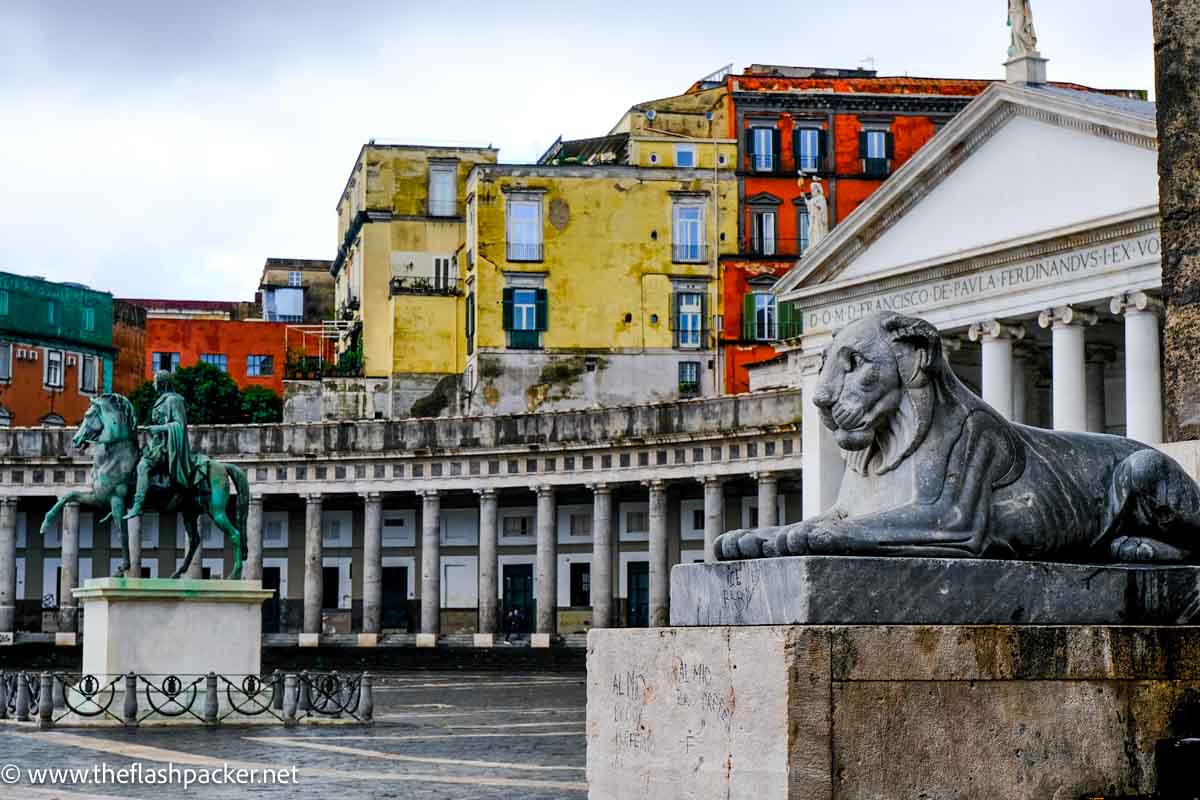
The square is flanked by two majestic buildings.
Palazzo Reale (Royal Palace), one of four royal residences around Naples used by the Bourbon Kings, occupies its southern edge. Facing the Palazzo Reale, Basilica San Francesco di Paola embraces the piazza with its curving colonnades.
Stroll the streets of the historic centre of Naples
A UNESCO World Heritage site since 1995, the historic centre of Naples (centro storico) is a warren of old churches, small shops, cafes and bars. Naples was founded by Greek settlers in 470 B.C. and has retained the imprint of successive cultures that occupied the city.
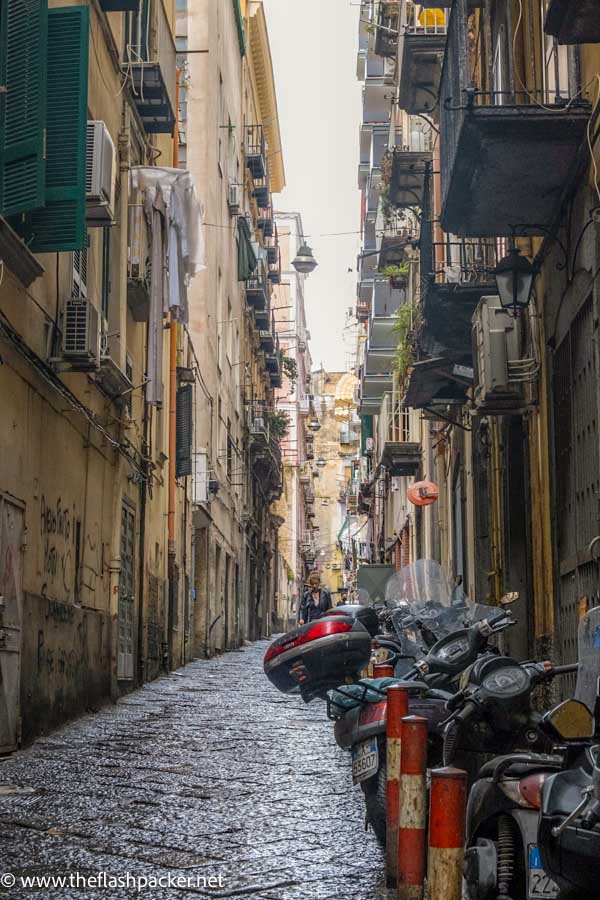
The historic centre is roughly bounded by the waterfront on the south, Via Toledo and the Spanish Quarter to its western edge and Via Floria on the northern edge. For tourists, Via Duomo marks its eastern side.
Spaccanapoli, meaning ‘Split Naples’ does exactly that. Lined with grocery barrows and one-of-a-kind shops, and inhabited by arch-Neapolitan characters, this is the heart of old Naples.
Don’t miss Via San Gregorio Armeno, which is tucked between Spaccanapoli and Via dei Tribunali. This charming lane is known across Italy for its artisan shops selling handcrafted pastori, or nativity-scene figurines.
Go underground at Galleria Borbonica
Naples is a city with buried secrets. Tunnels, caves, and catacombs lace their way under the city, and I recommend going underground at least once during your day in Naples.
Galleria Borbonica (Bourbon Gallery or Bourbon Tunnel) has a fascinating history.
It housed immense water tanks in the 1600s and served as an escape for the Bourbon royal family. It was an air-raid shelter during World War II and an impound lot.
A section of the tunnel is a Vespa graveyard, populated with confiscated souped-up scooters that have exceeded the 50km/hour speed limit.
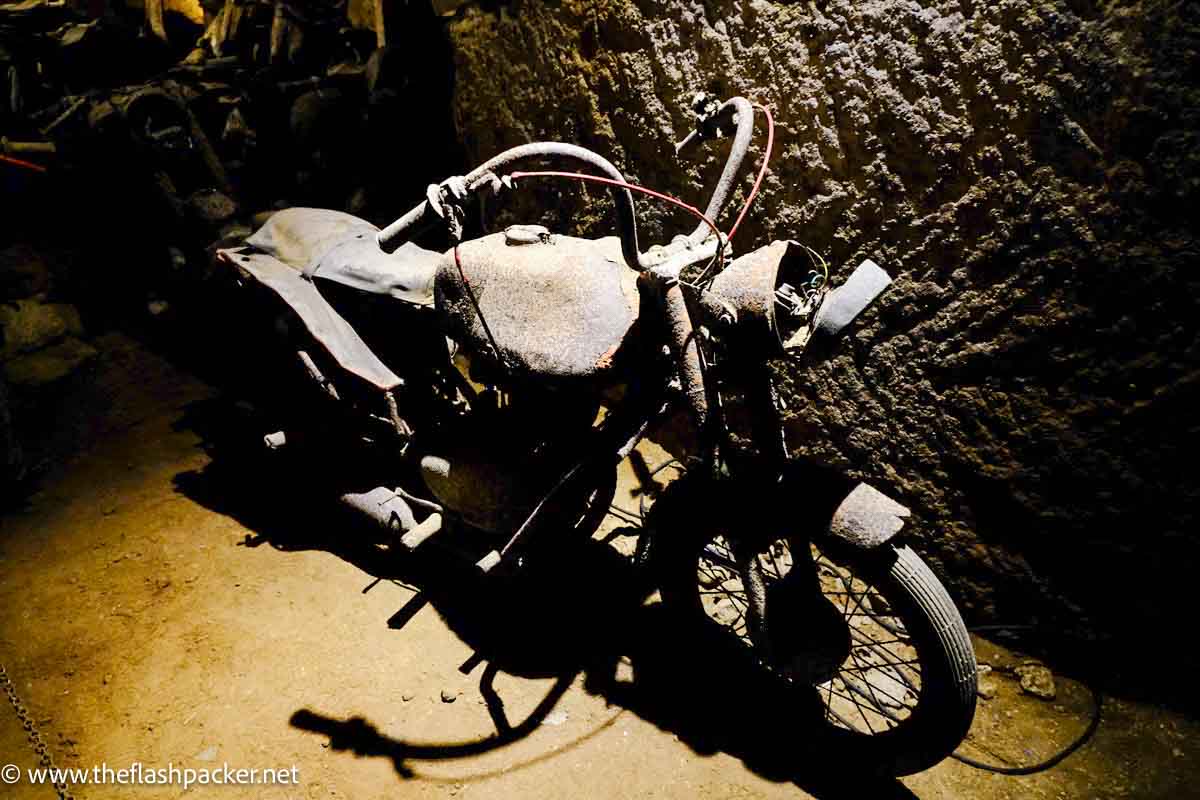
Address: Vico del Grottone, 4
Opening hours: Tours take place on Friday – Sunday and on public holidays at 10 am, 12 pm, 3 pm and 5 pm.
>>> CLICK HERE TO BUY YOUR SKIP-THE-LINE TICKET
Visit Naples Cathedral
Naples is home to more than 450 churches but the most important is Naples Cathedral. The cathedral is dedicated to San Gennaro, the patron saint of the city, and is variously known as the Duomo di Napoli, Duomo di San Gennaro and the Santa Maria Assunta Cathedral.
It was built in the 13th Century on the remains of the ancient temple dedicated to the god Apollo. In the late 17th century it was reworked in flamboyant Baroque fashion with the later addition of a late nineteenth-century Neo-Gothic façade.
With a golden Byzantine mosaic and frescoes galore, the best stuff is on the inside. But most importantly, the cathedral is the home of the skull of San Gennaro and an ampoule that encloses his blood.
It is said that the saint’s blood liquefies twice a year. If the miracle of liquefaction doesn’t occur, misfortune will strike the town.
Address: Via Duomo, 147
Opening hours: Check here. Usually closed between lunchtime and late afternoon.
Closest metro stations: Metro Line 1 University / Metro Line 2 Cavour
Ticket price: Free admission. Small charge to enter the Baptistery.
Other churches in Naples
Two other churches worth adding to your one-day Naples itinerary are San Lorenzo Maggiore Basilica and San Domenico Maggiore Church.
Located in the exact geographical centre of historic Naples, San Lorenzo Maggiore Basilica is famous for the remains of an ancient two-storey Greco-Roman market beneath its floors.
Visit San Domenico Maggiore Church for its lavishly decorated interior featuring intricate gold details and a dramatic altar.
Get your history fix at the National Archaeological Museum of Naples
Naples National Archaeological Museum (MANN) is one of the great museums of the world.
Starting life as an army barracks in the 16th Century, it was converted into a museum in the 19th Century. This massive museum is spread across four floors and is home to an extensive collection of Greek and Roman antiquities, as well as artefacts from Ancient Egypt.
Visiting MANN is one of the best things to do in Naples if you are planning to visit Pompeii or Herculaneum. Valuable treasures from these two sites are displayed here, giving you greater insight into daily life in Pompeii and Herculaneum.
The museum’s other highlight is the Farnese Collection. This collection of classic sculptures and objects from the villas of ancient Rome is one of the world’s most important Greco-Roman exhibitions.
Address: Piazza Museo, 19
Opening hours: Wednesday to Monday 9 am to 7.30 pm. Closed on Tuesdays.
Closest metro stations: Museo or Cavour, lines 1 and 2
Admission fee: Ticket price applies. Free on the first Sunday of the month and a few selected dates.
More information here.
Admire views of Vesuvius with a walk through Santa Lucia
Walk along the Lungomare waterfront in the Santa Lucia district of Naples for views across the Bay of Naples. Mount Vesuvius looms menacingly on the other side of the water.
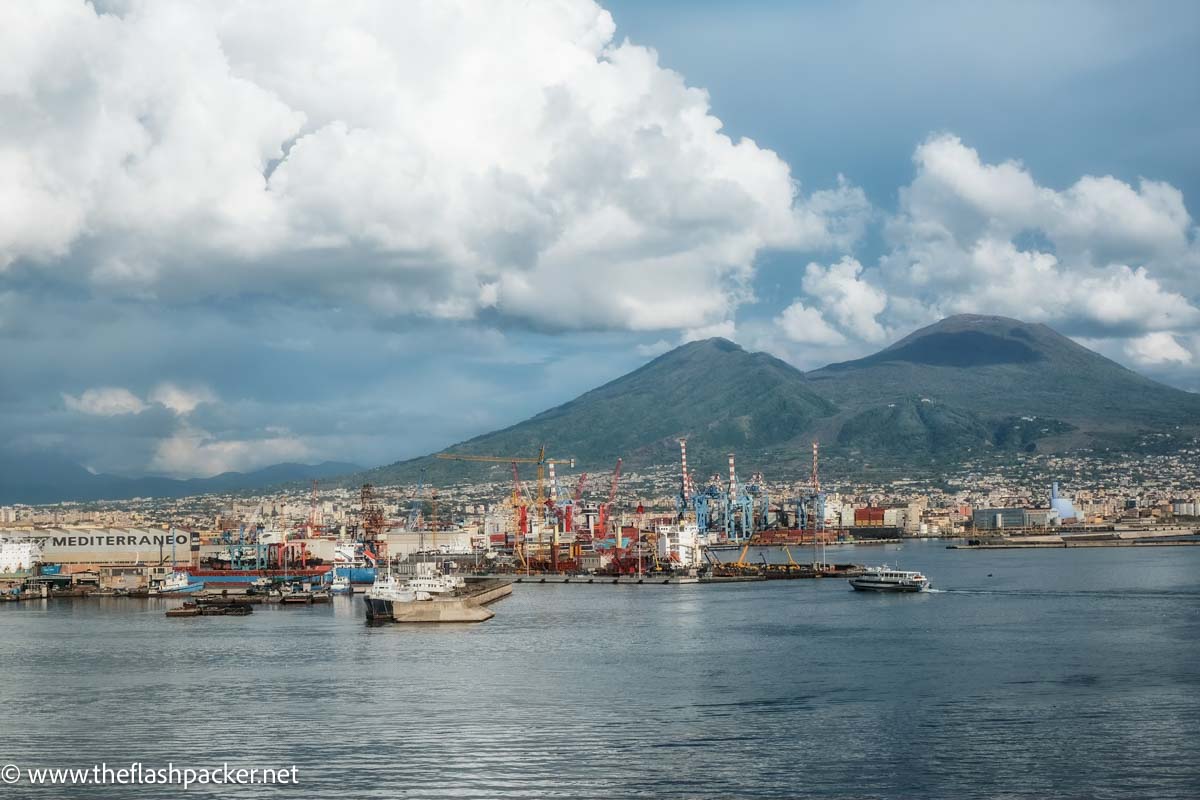
Santa Lucia’s fishermen were evicted following an enormous landfill project and this attractive area is now home to restaurants and some of Naples’ finest hotels.
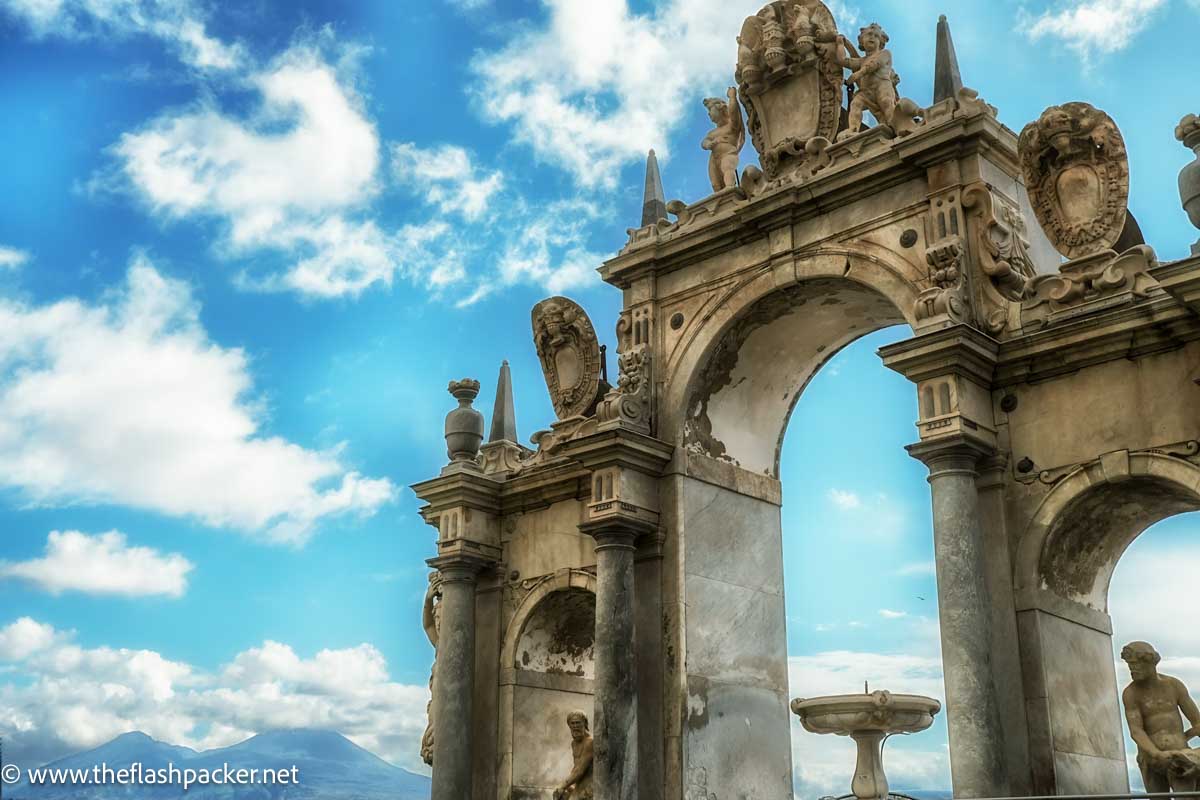
Visit Castel dell’Ovo
At the end of the Lungomare, on the Borgo Marinaro island, is Naples’ oldest, and most picturesque, castle.
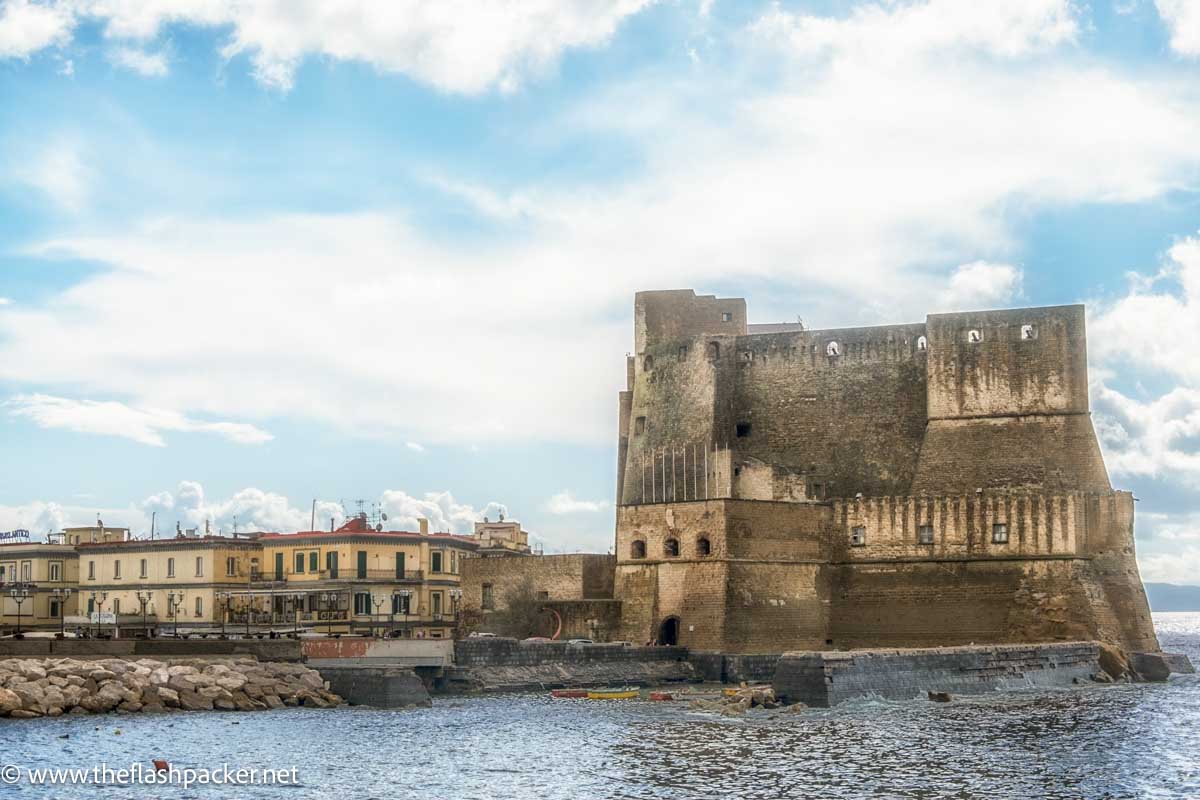
Castel dell’Ovo was built by the Normans in the 12th century. Prior to that, the site played host to the last Western Roman Emperor, Romulus Augustulus, during his exile.
Today, the castle today is used for events and temporary art exhibitions, but you can take a walk around its fortified walls for free.
Eat pizza
There is one thing that you must do if you have just one day in Naples. Eat pizza! One of the best reasons to visit Italy is to feast on pizza and Naples is where it all began.
In 1889 King Umberto I and Queen Margherita needed a respite from their relentless diet of French Haute Cuisine. It just goes to show that you can get too much of a good thing.
Amongst the selection presented to the royal couple, the queen preferred the pizza topped with mozzarella, tomatoes and basil (coincidentally, the colours of the Italian flag).
And so Pizza Margherita was born. This may be an urban myth but is a compelling story nonetheless.

L’Antica Pizzeria da Michele is reputed to make the best pizza in Naples. This is also where Julia Roberts munched on a slice of pizza in the movie Eat, Pray, Love.
The pizzeria is on Via Cesare Sersale, close to Naples Cathedral and a 20-minute walk from Naples cruise port. Expect to queue.
Guided Tours of Naples
If you don’t feel comfortable exploring Naples on your own or are looking for greater insight into the city’s history, culture and way of life, consider joining an organised walking tour.
I use GetYourGuide to source and book day excursions. Not only does the platform offer an extensive selection of tours from independent operators, but there is also a very generous cancellation policy.
Here are a few highly-rated tours related to the activities in this article:
Historic Centre of Naples Walking Tour
This 2.5-hour walking tour takes in the streets around Spaccanapoli and includes a visit to Cappella San Severo where the Veiled Christ is housed.
>>> CLICK HERE TO BOOK
Naples: Street Food Tour with Local Guide
If sampling the local cuisine is more your thing, try some of the tastiest street foods in Naples as you stroll around the city’s historic centre. As you might expect, pizza is included as is a shot of limoncello and gelato.
>>> CLICK HERE TO BOOK
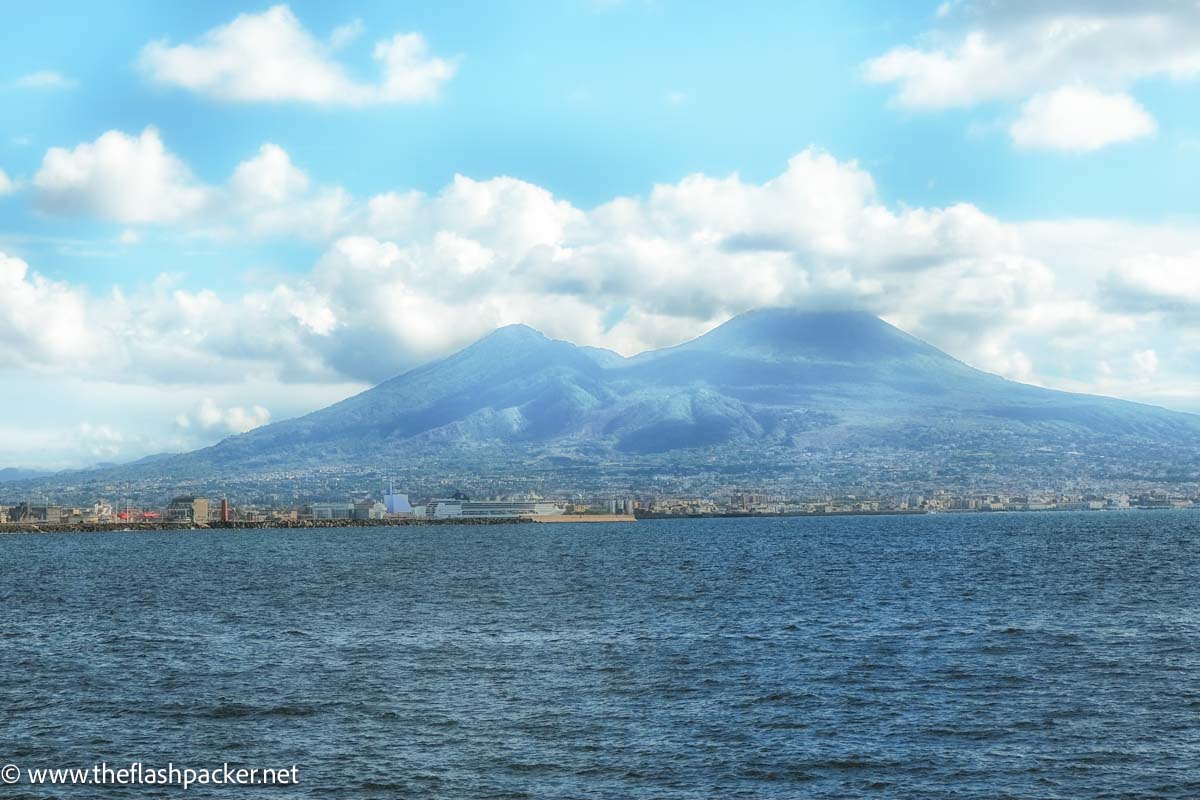
Going Further Afield
Maybe you’ve already visited Naples and want to explore the beauty of the Amalfi Coast or the historic sites of Pompeii or Herculaneum. All of these places are easy day trips from Naples, even if you are a cruise passenger.
As with any onshore activities, always check that you will be able to make it back to the ship in plenty of time. If in doubt, book a shore excursion that guarantees to deposit you back at the port before your ship sails away.
Sorrento
Sorrento was the first place I visited on the Amalfi coast more than 30 years ago. Famous for its lemons and high-pedigree hotels, this laid-back town has been popular with tourists since the Grand Tours of the 19th Century.
This is the place to replenish your supplies of limoncello.
Stop for a coffee or lunch in one of the small cafes Piazza Tasso, Sorrento’s main square. Pick up gifts in the town’s famous small ceramics, lacework and marquetry (woodwork) shops.
But, best of all, take in the dramatic views over the Bay of Naples from Sorrento’s lofty clifftop location.
A ferry will take you across the Bay of Naples to Sorrento in 40 minutes. This service departs multiple times a day during the main travel season that runs from April through October.
Alternatively, take the Circumvesuviana train (50 – 70 minutes) or Campania Express (one hour) to Sorrento.
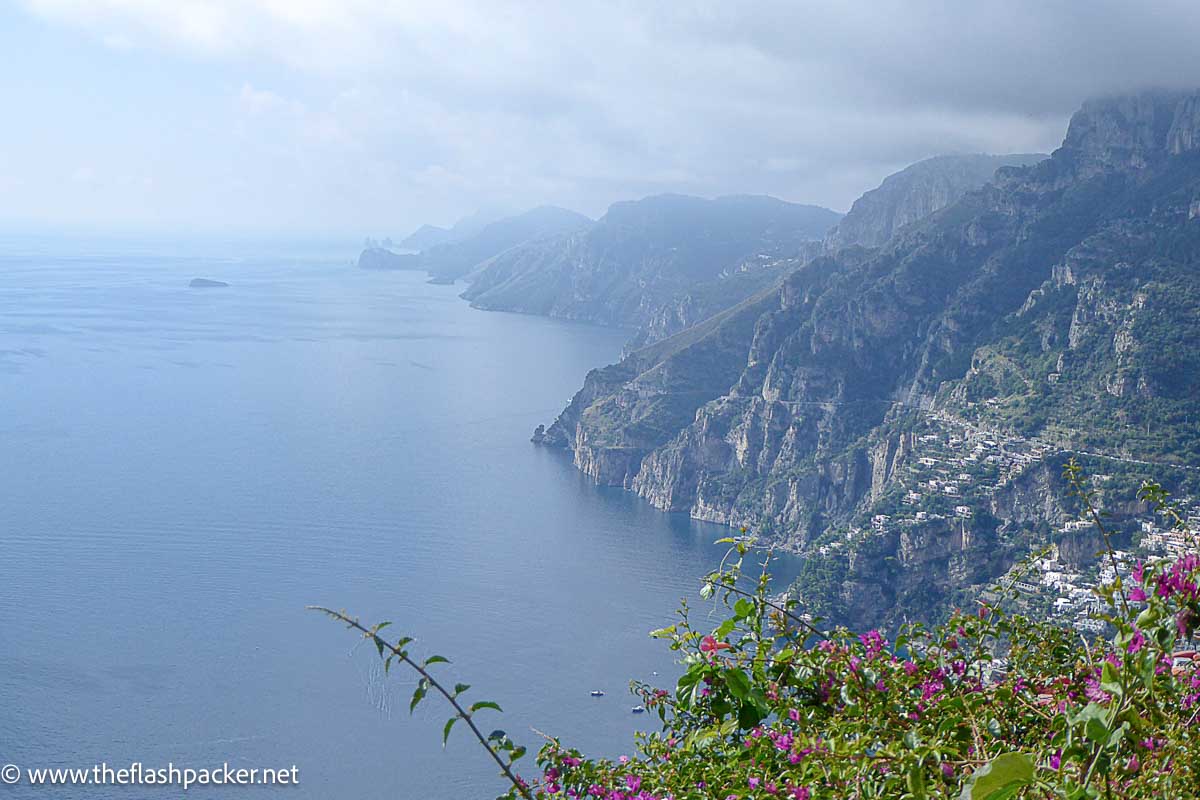
Island of Capri
Capri is an enchaining garden of Eden with over 8,000 species of flora tumbling over a sheer chunk of limestone, eroded over time into fantastical forms.
The Blue Grotto (Grotto Azzura) is Capri’s headline act. The shimmering, iridescent blueness of the water in this sea cave is due to the reflection of light on the water in the morning.
Renowned as a playground for Roman Emperors, artists and the Hollywood glitterati, Capri’s jaw-dropping beauty comes at a hefty price. Capri town is awash with designer boutiques and jewellery shops, and the island also prides itself on its fine dining.
To reach Capri from Naples, take a high-speed hydrofoil.
The hydrofoil service operates from the Molo Beverello pier and takes about 40 minutes to get to Capri. You can check the timetable here.
Buy your ticket in advance if you are travelling in high season (July and August)
Pompeii
The UNESCO World Heritage Site of Pompeii barely needs an introduction.
Pompeii was once a cosmopolitan resort town inhabited by wealthy Romans. All this ended in 79 A.D when the town was buried under the volcanic ash of Mount Vesuvius.
Today’s visitors to Pompeii can stroll along the town’s ancient paved streets and view the remains of its lavish villas, elegantly bathhouses, temples and massive 20,000-seater amphitheatre.
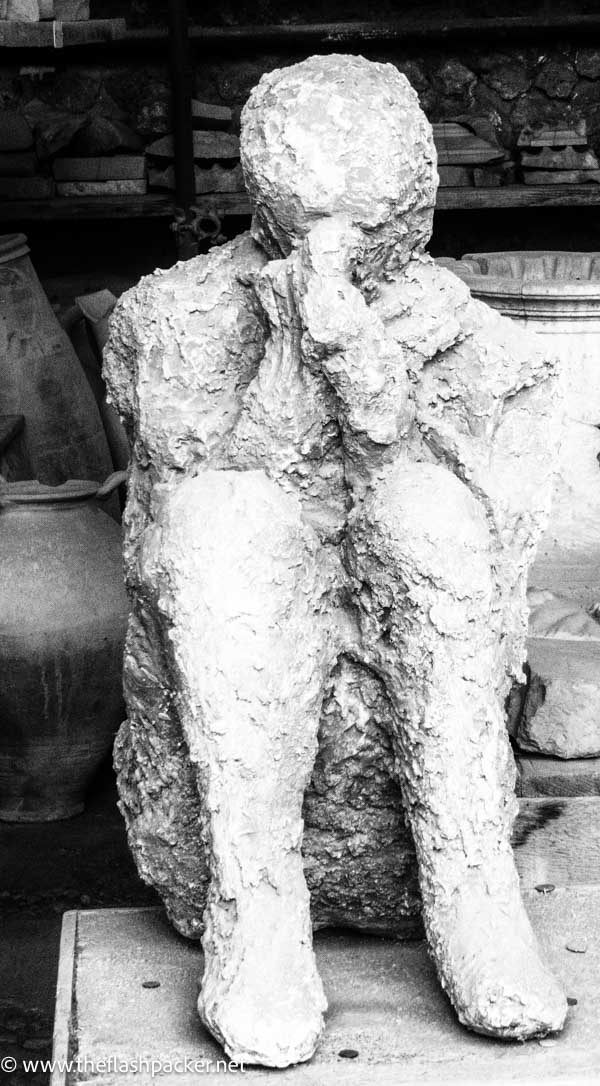
>>> CLICK HERE TO BUY YOUR SKIP-THE-LINE TICKET WITH AUDIO GUIDE
I have been to Pompeii twice, once with a guide and once without. From my experience, this is one place where it is worth paying for a guided tour.
Pompeii’s ruins are huge and sometimes confusing with little signage. A map and guidebook are unlikely to cut it here.
Take the Circumvesuviana or Campana Express to Pompeii Scavi, which is across the street from the main entrance to the Pompeii archaeological site. The journey time is 25–40 minutes.
>>> Visit Pompeii and Mount Vesuvius on a day tour from Naples. Click here for further information and to book.
Herculaneum
For a different perspective, visit Herculaneum, a few stops along the Circumvesuviana train line towards Naples or Sorrento.
Herculaneum suffered the same fate as Pompeii when Vesuvius erupted. However, its buildings are better preserved than those of its neighbour, many having their upper storey intact.
The tragedy of Herculaneum feels immediate.
The town’s boathouses are home to the skeletons of hundreds of people sheltering from the eruption. Whilst waiting for a boat to rescue them, their flesh was vaporised by an intense wave of hot gas, leaving only their charred bones.

Along with Pompeii, Herculaneum is also a UNESCO World Heritage Site.
Take the Circumvesuviana or Campania Express to Ercolano Scavi, which is in the centre of town. The journey time is 10–20 minutes.
The entrance to the archaeological site is a 5–10-minute walk along the main street.
Can you visit Pompeii, Vesuvius and Herculaneum in one day?
Whilst this should be possible on a typical cruise ship schedule, it will be a long day and could feel overwhelming. Pompeii demands at least a half-day and you will need a minimum of two hours to visit Herculaneum. For this reason, I don’t recommend it.
Getting Around Naples
Naples’ historic centre is an easy 10-minute walk from the cruise terminal. Once you leave the cruise terminal, follow the passenger walkway that will take you to the Piazza del Plebiscito in the heart of the historic city centre.
Walking is the easiest way to explore Naples.
If you want to visit places that are further out or reach the city’s main railway station, your best option is line 1 of the city’s metro system, also known as the “Art Line” thanks to the works of art decorating its stops.
A single ticket is valid for 90 minutes. Day tickets offering unlimited journeys are also available.
Municipio is the closest metro station to the cruise terminal.
Naples also has a hop-on-hop-off (HOHO) bus. There is a bus stop outside the terminal, adjacent to Castel Nuovo that you’ll spot upon exiting the terminal building.
The HOHO bus follows two different routes stopping at principal sights and attractions in Naples. In the summer months, a third route takes you to the San Martino Monastery. An audio commentary is included.
Whilst this is a hassle-free way of getting around Naples, the city’s traffic is legendary and there’s every chance you will spend a chunk of your time in congested streets.
>>> CLICK HERE TO BUY YOUR HOHO BUS TICKET
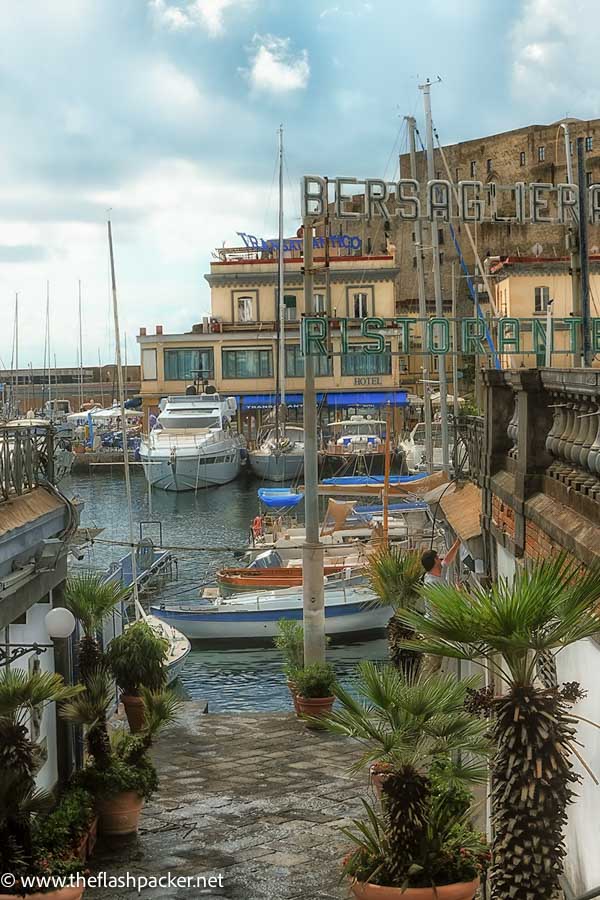
Getting To and From Naples Cruise Port
By train
From Porta Nolana
The closest railway station to Naples cruise port is Porta Nolana, a 30-minute walk northeast. If you prefer, you can take metro line 1 from Colombo station near the marina to Garibaldi – Circumvesuviana.
Otherwise, the Naples Alibus Airport Shuttle leaves from outside Stazione Marittima and stops outside Napoli Centrale station. From here, it’s a ten-minute walk to Porta Nolana.
From Garibaldi station
Alternatively, Garibaldi station, on the lower level of Naples’ main railway station, is just over two miles from the cruise terminal. To reach Garibaldi station by public transport, take the metro line 1 from Municipio station to Piazza Garibaldi, or the Naples Alibus Airport Shuttle from the port.
Circumvesuviana train service
From Naples Garibaldi or Porta Nolana, the private Circumvesuviana train service connects the city to Sorrento via Pompeii and Herculaneum, with countless stops along the way. I recommend starting your journey at Porta Nolana station as this is the terminus and you stand a better chance of getting a seat.
Fares are low and services are frequent. But as this is predominantly a commuter line, it can get crowded. Timetable here.
Campania Express
The Campania Express is a faster and more comfortable alternative to the Circumvesuviana train. However, it is a more expensive and less frequent service that runs between April and October only.
Although these trains run on the same route as the Circumvesuviana, they stop only at popular tourist sites, including Pompeii, Herculaneum and Sorrento. Again, trains depart Naples from Napoli Porta Nolana and Garibaldi stations.
By ferry and hydrofoil
As Naples Cruise Terminal is located next to its ferry dock, it’s easy to jump on a boat across the Bay of Naples.
Is Naples Safe for Solo Cruisers?
Keeping safe is a priority for solo travellers, especially for first-time solo travellers.
Over the years, Naples has hit the headlines for all the wrong reasons. Filthy, crime-ridden, garbage-strewn; you name it, it’s been called it.
And yes; petty crime is a problem in Naples, but the same can be said for many major cities. This is not a reason for avoiding a destination; you just need to keep your wits about you.
Remain vigilant, keep your belongings close to you and use your hotel or cabin safe to store valuables.
Thank you for reading my Naples cruise port guide
I hope that it helps you have the best day in Naples. Even as a repeat visitor, I found that there were so many things to do that the main challenge was narrowing down the choices.
If you want to learn more about other great Mediterranean ports of call, take a peek at these articles:
- Western Mediterranean Cruise: Essential Tips, Ports & NCL Epic Review
- How to Spend One Day in Barcelona from a Cruise Ship (+ Self-guided Walking Tour)
- Is the Go City® Barcelona Pass Worth it in 2023? An Honest Review
- One Day in Palma de Mallorca, Spain: 8 Awesome Things to Do
- 35+ Famous Landmarks in Rome, Italy That You Will Love
PS. If you’ve found this guide helpful, Pin it to read later!
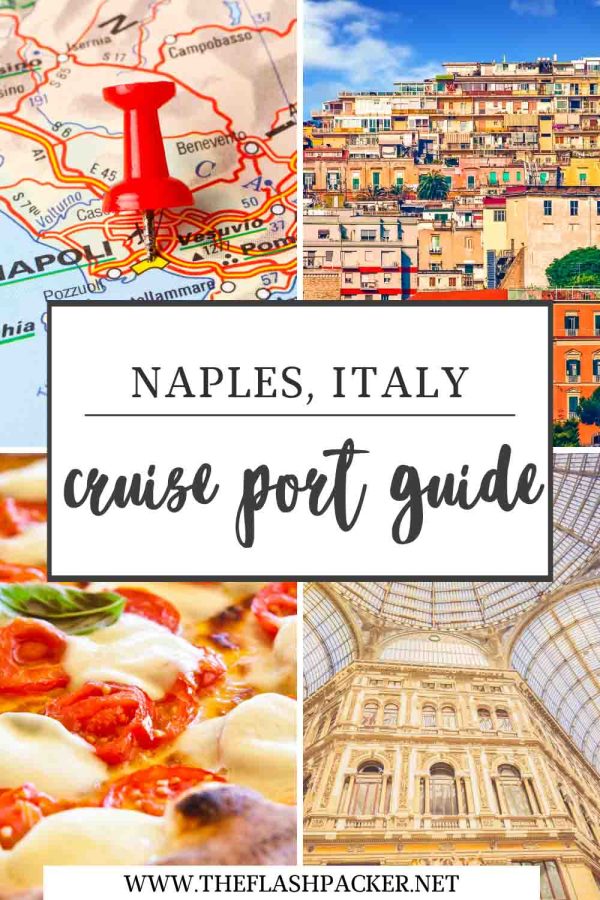
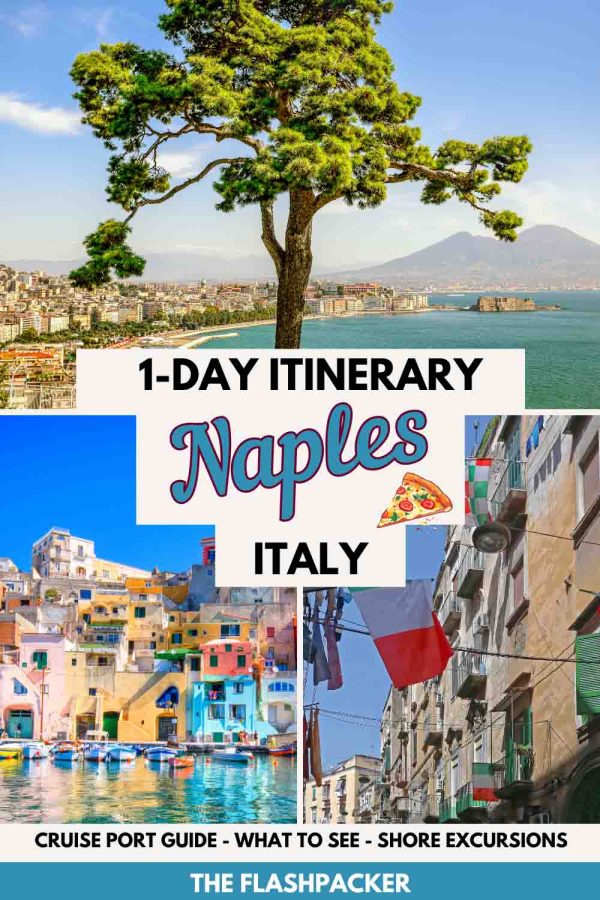

About Bridget
Bridget Coleman has been a passionate traveller for more than 30 years. She has visited 70+ countries, most as a solo traveller.
Articles on this site reflect her first-hand experiences.
To get in touch, email her at hello@theflashpacker.net or follow her on social media.
